
India, officially the Republic of India, is a country in South Asia. It is the seventh-largest country by area and the second-most populous country. Bounded by the Indian Ocean on the south, the Arabian Sea on the southwest, and the Bay of Bengal on the southeast, it shares land borders with Pakistan to the west; China, Nepal, and Bhutan to the north; and Bangladesh and Myanmar to the east. In the Indian Ocean, India is in the vicinity of Sri Lanka and the Maldives; its Andaman and Nicobar Islands share a maritime border with Thailand, Myanmar, and Indonesia.
Monitor or monitor may refer to:

The periodic table, also known as the periodic table of the (chemical) elements, is a rows and columns arrangement of the chemical elements. It is widely used in chemistry, physics, and other sciences, and is generally seen as an icon of chemistry. It is a graphic formulation of the periodic law, which states that the properties of the chemical elements exhibit an approximate periodic dependence on their atomic numbers. The table is divided into four roughly rectangular areas called blocks. The rows of the table are called periods, and the columns are called groups. Elements from the same group of the periodic table show similar chemical characteristics. Trends run through the periodic table, with nonmetallic character increasing from left to right across a period, and from down to up across a group, and metallic character increasing in the opposite direction. The underlying reason for these trends is electron configurations of atoms. The periodic table exclusively lists electrically neutral atoms that have an equal number of positively charged protons and negatively charged electrons and puts isotopes at the same place. Other atoms, like nuclides and isotopes, are graphically collected in other tables like the tables of nuclides.

The Philippines, officially the Republic of the Philippines, is an archipelagic country in Southeast Asia. In the western Pacific Ocean, it consists of 7,641 islands which are broadly categorized in three main geographical divisions from north to south: Luzon, Visayas, and Mindanao. The Philippines is bounded by the South China Sea to the west, the Philippine Sea to the east, and the Celebes Sea to the south. It shares maritime borders with Taiwan to the north, Japan to the northeast, Palau to the east and southeast, Indonesia to the south, Malaysia to the southwest, Vietnam to the west, and China to the northwest. It is the world's thirteenth-most-populous country, with diverse ethnicities and cultures. Manila is the country's capital, and its largest city is Quezon City; both are within Metro Manila.
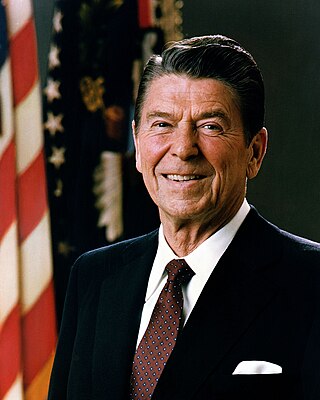
Ronald Wilson Reagan was an American politician and actor who served as the 40th president of the United States from 1981 to 1989. He previously served as the 33rd governor of California from 1967 to 1975 and as president of the Screen Actors Guild from 1947 to 1952 and from 1959 until 1960.
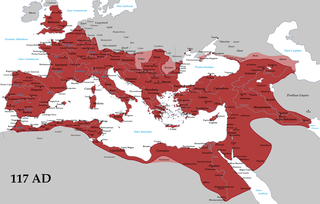
The Roman Empire was the post-Republican period of ancient Rome. As a polity, it included large territorial holdings around the Mediterranean Sea in Europe, North Africa, and Western Asia, and was ruled by emperors. From the accession of Caesar Augustus as the first Roman emperor to the military anarchy of the 3rd century, it was a Principate with Italia as the metropole of its provinces and the city of Rome as its sole capital. The Empire was later ruled by multiple emperors who shared control over the Western Roman Empire and the Eastern Roman Empire. The imperial seat moved from Rome to Byzantium and following the capture of the city of Rome in AD 476, it became its sole capital as Constantinople. The adoption of Christianity as the state church of the Roman Empire in AD 380 and the fall of the Western Roman Empire to Germanic kings conventionally marks the end of classical antiquity and the beginning of the Middle Ages. Because of these events, along with the prevalence of Greek instead of Latin, some historians distinguish the medieval Roman Empire that remained in the Eastern provinces as the Byzantine Empire.

William Shakespeare was an English playwright, poet and actor. He is regarded as the greatest writer in the English language and the world's pre-eminent dramatist. He is often called England's national poet and the "Bard of Avon". His extant works, including collaborations, consist of some 39 plays, 154 sonnets, three long narrative poems, and a few other verses, some of uncertain authorship. His plays have been translated into every major living language and are performed more often than those of any other playwright. He remains arguably the most influential writer in the English language, and his works continue to be studied and reinterpreted.
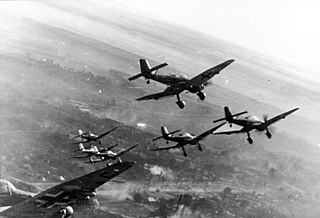
World War II or the Second World War, often abbreviated as WWII or WW2, was a global conflict that lasted from 1939 to 1945. The vast majority of the world's countries, including all of the great powers, fought as part of two opposing military alliances: the Allies and the Axis. Many participants threw their economic, industrial, and scientific capabilities behind this total war, blurring the distinction between civilian and military resources. Aircraft played a major role, enabling the strategic bombing of population centres and the delivery of the only two nuclear weapons ever used in war.

Victoria was Queen of the United Kingdom of Great Britain and Ireland from 20 June 1837 until her death in 1901. Her reign of 63 years and 216 days was longer than that of any previous British monarch and is known as the Victorian era. It was a period of industrial, political, scientific, and military change within the United Kingdom, and was marked by a great expansion of the British Empire. In 1876, the British Parliament voted to grant her the additional title of Empress of India.

Jesus, also referred to as Jesus Christ or Jesus of Nazareth, was a first-century Judean preacher and religious leader. He is the central figure of Christianity, the world's largest religion. Most Christians believe he is the incarnation of God the Son and the awaited Messiah prophesied in the Hebrew Bible.

Methamidophos, trade name "Monitor," is an organophosphate insecticide.
This is the list of extremely hazardous substances defined in Section 302 of the U.S. Emergency Planning and Community Right-to-Know Act. The list can be found as an appendix to 40 C.F.R. 355. Updates as of 2006 can be seen on the Federal Register, 71 FR 47121.

Canada is a country in North America. Its ten provinces and three territories extend from the Atlantic Ocean to the Pacific Ocean and northward into the Arctic Ocean, making it the world's second-largest country by total area, with the world's longest coastline. It is characterized by a wide range of both meteorologic and geological regions. The country is sparsely inhabited, with the vast majority residing south of the 55th parallel in urban areas. Canada's capital is Ottawa and its three largest metropolitan areas are Toronto, Montreal, and Vancouver.

Islam is an Abrahamic monotheistic religion centered around the Quran and the teachings of Muhammad. Adherents of Islam, called Muslims, number approximately 2 billion globally and are the world's second-largest religious population after Christians.

The Rotterdam Convention is a multilateral treaty to promote shared responsibilities in relation to importation of hazardous chemicals. The convention promotes open exchange of information and calls on exporters of hazardous chemicals to use proper labeling, include directions on safe handling, and inform purchasers of any known restrictions or bans. Signatory nations can decide whether to allow or ban the importation of chemicals listed in the treaty, and exporting countries are obliged to make sure that producers within their jurisdiction comply.
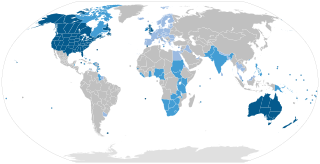
English is a West Germanic language in the Indo-European language family, with its earliest forms spoken by the inhabitants of early medieval England. It is named after the Angles, one of the ancient Germanic peoples that migrated to the island of Great Britain. Existing on a dialect continuum with Scots and then most closely related to the Low Saxon and Frisian languages, Modern English is genealogically Germanic. However, its vocabulary also shows major influences from French and Latin, plus some grammar and a small amount of core vocabulary influenced by Old Norse. Speakers of English are called Anglophones.
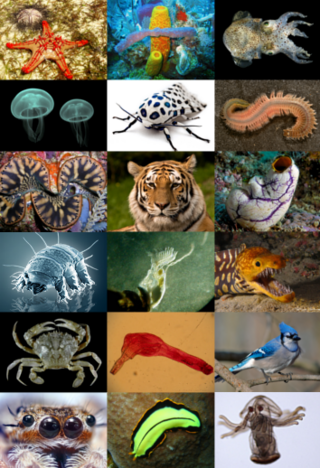
Animals are multicellular, eukaryotic organisms in the biological kingdom Animalia. With few exceptions, animals consume organic material, breathe oxygen, are able to move, can reproduce sexually, and grow from a hollow sphere of cells, the blastula, during embryonic development. As of 2022, 2.16 million living animal species have been described—of which around 1.05 million are insects, over 36,000 are fishes, around 11,700 are reptiles, over 11,100 are birds, and 6,596 mammals—but it has been estimated there are around 7.77 million animal species in total. Animals range in length from 8.5 micrometres (0.00033 in) to 33.6 metres (110 ft). They have complex interactions with each other and their environments, forming intricate food webs. The scientific study of animals is known as zoology.

Food contamination refers to the presence of harmful chemicals and microorganisms in food, which can cause consumer illness. This article addresses the chemical contamination of foods, as opposed to microbiological contamination, which can be found under foodborne illness.

Acephate is an organophosphate foliar and soil insecticide of moderate persistence with residual systemic activity of about 10–15 days at the recommended use rate. It is used primarily for control of aphids, including resistant species, in vegetables and in horticulture. It also controls leaf miners, caterpillars, sawflies, thrips, and spider mites in the previously stated crops as well as turf, and forestry. By direct application to mounds, it is effective in destroying imported fire ants.

Food safety incidents in China have received increased international media scrutiny following the reform and opening of the country, and its joining the World Trade Organization. Urban areas have become more aware of food safety as their incomes rise. Food safety agencies in China have overlapping duties. The 2008 Chinese milk scandal and COVID-19 pandemic received the most attention among food safety incidents.


















